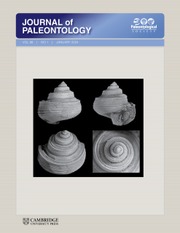Crossref Citations
This article has been cited by the following publications. This list is generated based on data provided by
Crossref.
Hone, David W.E.
Witton, Mark P.
and
Habib, Michael B.
2018.
Evidence for the Cretaceous sharkCretoxyrhina mantellifeeding on the pterosaurPteranodonfrom the Niobrara Formation.
PeerJ,
Vol. 6,
Issue. ,
p.
e6031.
Pentland, Adele H.
and
Poropat, Stephen F.
2019.
Reappraisal of Mythunga camara Molnar & Thulborn, 2007 (Pterosauria, Pterodactyloidea, Anhangueria) from the upper Albian Toolebuc Formation of Queensland, Australia.
Cretaceous Research,
Vol. 93,
Issue. ,
p.
151.
Bellardini, Flavio
and
Codorniú, Laura
2019.
First Pterosaur Post-Cranial Remains from the Lower Cretaceous Lohan Cura Formation (Albian) of Patagonia, Argentina.
Ameghiniana,
Vol. 56,
Issue. 2,
p.
116.
Bestwick, Jordan
Unwin, David M.
Butler, Richard J.
and
Purnell, Mark A.
2020.
Dietary diversity and evolution of the earliest flying vertebrates revealed by dental microwear texture analysis.
Nature Communications,
Vol. 11,
Issue. 1,
Zhou, Chang-Fu
Wang, Jiahao
and
Zhu, Ziheng
2020.
A new wing skeleton of <i>Forfexopterus</i> (Pterosauria: Ctenochasmatidae) from the Early Cretaceous Jehol Biota reveals a developmental variation.
Fossil Record,
Vol. 23,
Issue. 2,
p.
191.
Andres, Brian
and
Langston, Wann
2021.
Morphology and taxonomy ofQuetzalcoatlusLawson 1975 (Pterodactyloidea: Azhdarchoidea).
Journal of Vertebrate Paleontology,
Vol. 41,
Issue. sup1,
p.
46.
Naish, Darren
Witton, Mark P.
and
Martin-Silverstone, Elizabeth
2021.
Powered flight in hatchling pterosaurs: evidence from wing form and bone strength.
Scientific Reports,
Vol. 11,
Issue. 1,
Averianov, Alexander O
and
Arkhangelsky, Maxim S
2021.
A large pteranodontid pterosaur from the Late Cretaceous of Eastern Europe.
Geological Magazine,
Vol. 158,
Issue. 7,
p.
1143.
Griffin, Christopher T.
Stocker, Michelle R.
Colleary, Caitlin
Stefanic, Candice M.
Lessner, Emily J.
Riegler, Mitchell
Formoso, Kiersten
Koeller, Krista
and
Nesbitt, Sterling J.
2021.
Assessing ontogenetic maturity in extinct saurian reptiles.
Biological Reviews,
Vol. 96,
Issue. 2,
p.
470.
Fernandes, Alexandra E.
Mateus, Octávio
Andres, Brian
Polcyn, Michael J.
Schulp, Anne S.
Gonçalves, António Olímpio
and
Jacobs, Louis L.
2022.
Pterosaurs from the Late Cretaceous of Angola.
Diversity,
Vol. 14,
Issue. 9,
p.
741.
Smith, Roy E.
Chinsamy, Anusuya
Unwin, David M.
Ibrahim, Nizar
Zouhri, Samir
and
Martill, David M.
2022.
Small, immature pterosaurs from the Cretaceous of Africa: implications for taphonomic bias and palaeocommunity structure in flying reptiles.
Cretaceous Research,
Vol. 130,
Issue. ,
p.
105061.
Augustin, Felix J.
Kampouridis, Panagiotis
Hartung, Josephina
Albersdörfer, Raimund
and
Matzke, Andreas T.
2022.
The geologically oldest specimen of Pterodactylus: a new exquisitely preserved skeleton from the Upper Jurassic (Kimmeridgian) Plattenkalk deposits of Painten (Bavaria, Germany).
Fossil Record,
Vol. 25,
Issue. 2,
p.
331.
Zhou, Chang-Fu
Yu, Dongxiang
Zhu, Ziheng
and
Andres, Brian
2022.
A new wing skeleton of the Jehol tapejarid Sinopterus and its implications for ontogeny and paleoecology of the Tapejaridae.
Scientific Reports,
Vol. 12,
Issue. 1,
Duque, Rudah Ruano C.
Pinheiro, Felipe L.
and
Barreto, Alcina Magnólia Franca
2022.
The ontogenetic growth of Anhangueridae (Pterosauria, Pterodactyloidea) premaxillary crests as revealed by a crestless Anhanguera specimen.
Journal of Vertebrate Paleontology,
Vol. 42,
Issue. 1,
Jiang, Shunxing
Wang, Xiaoli
Zheng, Xiaoting
Cheng, Xin
Wang, Xiaolin
Wei, Guangjin
and
Kellner, Alexander W. A.
2022.
Two emetolite-pterosaur associations from the Late Jurassic of China: showing the first evidence for antiperistalsis in pterosaurs.
Philosophical Transactions of the Royal Society B: Biological Sciences,
Vol. 377,
Issue. 1847,
Yang, Zixiao
Jiang, Baoyu
Benton, Michael J.
Xu, Xing
McNamara, Maria E.
and
Hone, David W. E.
2023.
Allometric wing growth links parental care to pterosaur giantism.
Proceedings of the Royal Society B: Biological Sciences,
Vol. 290,
Issue. 2003,
Pentland, Adele H.
Vickers-Rich, Patricia
Rich, Thomas H.
Rigby, Samantha L.
and
Poropat, Stephen F.
2024.
Oldest pterosaur remains from Australia: evidence from the Lower Cretaceous (lower Albian) Eumeralla Formation of Victoria.
Historical Biology,
Vol. 36,
Issue. 7,
p.
1188.
Xu, Yizhi
Jiang, Shunxing
and
Wang, Xiaolin
2024.
The restudy of Haopterus gracilis from the Yixian Formation, Liaoning, China.
Cretaceous Research,
Vol. 162,
Issue. ,
p.
105933.
Song, Junyi
Jiang, Shunxing
and
Wang, Xiaolin
2024.
Postcranial anatomy of
Dsungaripterus weii
(Pterosauria: Ornithocheiroidea) from the Lower Cretaceous of Wuerho, China
.
Journal of Vertebrate Paleontology,
Vol. 44,
Issue. 2,
Jung, Jongyun
and
Huh, Min
2024.
New Pterosaur Tracks from the Hwasun Seoyuri Tracksite (Turonian) of South Korea: Implications for their Ecological Niche and Habitat.
Palaeogeography, Palaeoclimatology, Palaeoecology,
Vol. 645,
Issue. ,
p.
112218.

